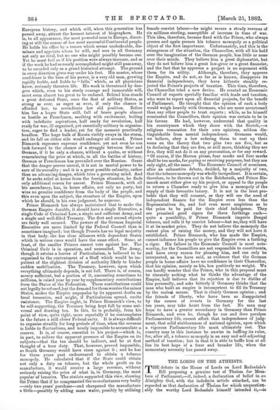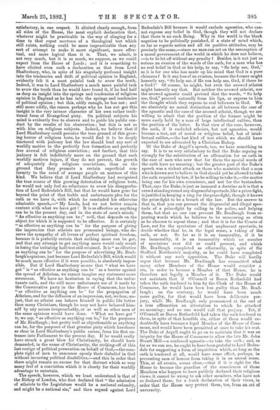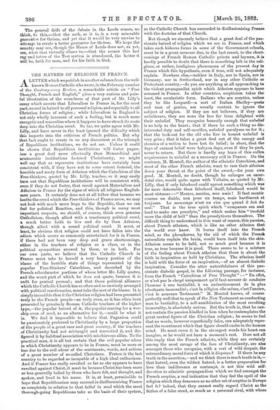THE LORDS ON THE ATHEISTS.
THE debate in the House of Lords on Lord nedesdale's Bill proposing a genuine test of Theism for Mem- bers of Parliament,—if, indeed, a declaration of belief in an Almighty God, with the indefinite article attached, can be regarded as that declaration of Theism for which unquestion- ably the worthy Lord Redesdale himself intended
satisfactory, in one respect. It elicited clearly enough, from all sides of the House, the most explicit declaration that, whatever might be practicable in the way of clinging for a
time to that caput 1710211121711 of a theological test which still exists, nothing could be more impracticable than any
sort of attempt to make it more significant, more effec- tual, and more logical than it is. That, we admit, is not very much, but it is as much, we suppose, as we could expect from the House of Lords ; and it is something to have elicited even such a declaration as that from Lord Shaftesbury, who, in spite of his singularly profound insight into the tendencies and drift of political opinion in England, evidently felt it a most painful task to avow the truth. Indeed, it was to Lord Shaftesbury a much more painful task to avow the truth than he would have found it, if he had half as deep an insight into the springs and tendencies of religious opinion in England as he has into the springs and tendencies of political opinion ; but this, oddly enough, he has not ; and still more oddly, the reason perhaps why he has not got this insight is the very intense character of his own rather tradi- tional form of Evangelical piety. On political subjects his mind is evidently free to observe and to guide his public con- duct by the results of his observation ; but this is not so with him on religious subjects. Indeed, we believe that if Lord Shaftesbury could perceive the true ground of this grow- ing horror of religious tests, he would find it to be deeply tinctured with jealousy lest the law should lend any sort of worldly motive to the perfectly free formation and perfectly free avowal of religious conviction-; and further, that this jealousy is felt indefinitely more on the ground that such worldly motives injure, if they do not prevent, the growth of adequately deep religious convictions, than on the ground that they promote a certain superficial con- formity to the creed of average people on matters of this kind. We believe that if Lord Shaftesbury had recognised the true source of this growing detestation of religious tests, he would not only feel no reluctance to avow his disapproba- tion of Lord Redesdale's Bill, but that he would have gone far beyond the point of that feeble and unfortunate plea for the oath as we have it, with which he concluded his otherwise admirable speech,—" My Lords, had we not better remain content with what we have got ? It is as effective as anything can be in the present day, and in the state of men's minds."
"As effective as anything can be ;" well, that depends on the object for which it is supposed to be effective. It is certainly "as effective as anything can be" for the purpose of giving the impresaion that atheists are persecuted beings, who de- serve the sympathy of all lovers of perfect spiritual freedom, because it is perfectly certain that nothing more can be got, and that any attempt to get anything more would only result in losing the irritating half-test still retained. It is " as effective as anything can be" for the purpose of advertising Mr. Brad- laugh's opinions, just because Lord Redesdale's Bill, which would be much more effective if it were possible, is absolutely impos- sible. But if Lord Shaftesbury means that "what we have got" is "as effective as anything can be" as a barrier against the spread of Atheism, we cannot imagine any statement more erroneous. We have no hesitation in saying that the unfor- tunate oath, and the still more unfortunate use of it made by the Conservative party in the House of Commons, has been "as effective as anything can be" for the propagation of Atheism, and for the diffusion of an impression, not, we fear, un- just, that an atheist can behave himself in public life better than many Christians, though he may not have behaved him- self by any means irreproachably, or as well as other men of the same opinions would have done. "What we have got" is, we say, "as effective as anything can be," for the purposes of Mr. Bradlaugh ; but pretty well as objectionable as anything can be, for the purposes of that genuine piety which has shone so clear in Lord Shaftesbury's public career, from his first en- trance into Parliament to the present day. If he would really have struck a great blow for Christianity, he should have demanded, in the name of Christianity, the striking-off of this last vestige of political persecution on behalf of God,—the com- plete right of men to announce openly their disbelief in God without incurring political disabilities,—and this in order that there might remain no excuse for that distrust which so very many feel of a conviction which it is clearly for their worldly advantage to entertain.
The speech, however, which we least understand is that of the Bishop of London, who first declared that "the admission of atheists to the Legislature would be a national calamity, and might be a national sin," and then argued against Lord Redesdale's Bill because it would exclude agnostics, who can- not express any belief in God, though they will not declare that there is no such Being. Why in the world is the blank negation to be politically punished, if a state of mind which, so far as regards action and all its positive attitudes, may be precisely the same,—since no man can act on the assumption of a moral government of the world in which he does not believe, —is to be let off without any penalty? Besides, is it not just as serious an evasion of the words of the oath, for a man who has no real belief in God or his help, to say, "So help me, God," as it is for one who has made up his mind that God is a pure chimera ? Is it any less of an evasion, because the former might honestly say, "So help me, if He can help me, God, if there be a God r Of course, he might, but even the avowed atheist might honestly say that. But neither the avowed atheist, nor the avowed agnostic could pretend that the words, "So help me, God," proceed naturally from his lips, or express to him the thought which they express to real believers in God. We see absolutely no moral distinction at all between the case of the agnostic and the case of the avowed atheist, though we are willing to admit that the position of the former might be more easily held by a man of large intellectual calibre, than the position of the latter. In that view of the case, however, the oath, if it excluded atheists, but not agnostics, would become a test, not of moral or religious belief, but of intel- lectual calibre,—the last kind of test which we should have expected to see advocated by a Christian Bishop.
Of the Duke of Argyll's speech, too, we have something to say. It is to us very satisfactory to find the Duke arguing so strongly for the substitution of an affirmation for an oath in the case of men who aver that for them the special words of the oath have no meaning ; but the greater part of the Duke's speech was a violent attack on those who maintain that a man who is known not to believe in God should yet be allowed to take the oath required bylaw, if he be willing to take it,—the matter being one for his own conscience, and not for the bystanders. That, says the Duke, is just as immoral a doctrine as it is that a crowd standing round any disgraceful spectacle, like a prize-fight, is justified in keeping a ring for the prize-fight, though it knows the prize-fight to be a breach of the law. But the answer to that is, that you can prevent the disgraceful and illegal spec- tacle of a prize-fight by calling in the police, and helping them, but that no one can prevent Mr. Bradlaugh from re- peating words which he believes to be unmeaning so often as he chooses to repeat them ; and that it is for the Courts of Law, not for the spectators of that unpleasant spectacle, to decide whether that be, in the legal sense, a taking of the
oath, or not. So far as it is an immorality, if it be an immorality, it is an immorality which no number of spectators ever did or could prevent, and which Mr. Bradlaugh completed as effectually, in spite of Sir Stafford Northcote's majority, as he could have completed it without any such opposition. The Duke will hardly argue that because Mr. Bradlaugh has committed what many other Members of the House would consider a sin, in order to become a Member of that House, he is therefore not legally a Member of it. The Duke would not maintain that if O'Connell or Baron Rothschild had taken the oath tendered to him by the Clerk of the House of Commons, he would have been less guilty than Mr. Brad- laugh ; on the contrary, he would have been much more guilty, for that would have been deliberate per- jury, while Mr. Bradlaugh only pronounced at the end of
a true affirmation an attestation to which he attached no meaning ; and no one would call that perjury. Yet, if
O'Connell or Baron Rothschild had taken the oath tendered to
them, in spite of that horrible sin, either of them would un- doubtedly have become a legal Member of the House of Com- mons, and would have been permitted at once to take his seat.
The Duke of Argyll ought to go on to maintain that it was an iniquity for the House of Commons to allow the late Mr. John Stuart Mill—a confessed agnostic—to take the oath ; and, so far as we can see, he ought to have been grateful to Lord Redes-
dale for suggesting a form of inquisition which, so long as the oath is tendered at all, would have some effect, perhaps, in preventing men of honour from taking it in an unreal sense. This, at all events, seems clear,—that if it is right for the House to become the guardian of the consciences of those
Members who happen to have publicly declared their religious views, it cannot be wrong to ask other members, who have not
so declared them, for a frank declaration of their views, in order that the House may protect them, too, from an act vf unveracity.
The general drift of the debate in the Lords comes, we think, to this,—that the oath, as it is, is a very miserable guarantee for theism, and yet that it would be very unwise to attempt to create a better guarantee for theism. We hope the country may see, though the House of Lords does not, as yet, see, what that virtually comes to,—that the sooner this last rag and tatter of the Test system is abandoned, the better it will be, both for man, and for his faith in God.




































 Previous page
Previous page